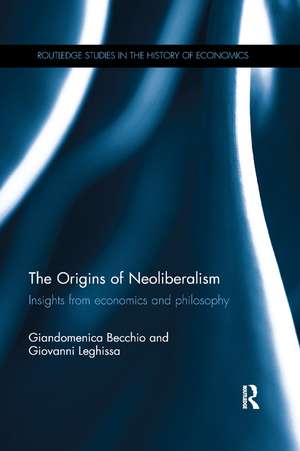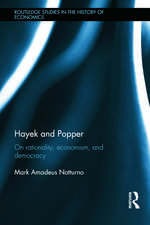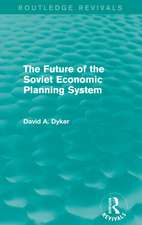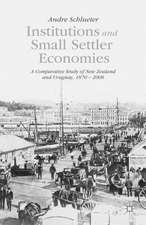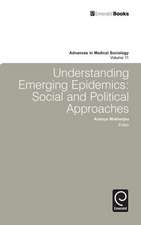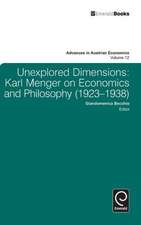The Origins of Neoliberalism: Insights from economics and philosophy: Routledge Studies in the History of Economics
Autor Giandomenica Becchio, Giovanni Leghissaen Limba Engleză Paperback – 12 dec 2019
In The Origins of Neoliberalism, the joint effort of an economist and a philosopher offers a theoretical overview of both neoliberalism’s genesis within economic theory and social studies as well as its development outside academia. Tracing the sources of neoliberalism within the history of economic thought, the book explores the differences between neoliberalism and classical liberalism. This book’s aim is to make clear that neoliberalism is not a natural development of the old classical liberalism, but rather that it represents a dramatic alteration of its original nature and meaning. Also, it fights against the current idea according to which neoliberalism would coincide with the triumph of free market economy.
In its use of both history of economics and philosophy, this book takes a highly original approach to the concept of neoliberalism. The analysis presented here will be of great interest to scholars and students of history of economics, political economy, and philosophy of social science.
| Toate formatele și edițiile | Preț | Express |
|---|---|---|
| Paperback (1) | 389.38 lei 6-8 săpt. | |
| Taylor & Francis – 12 dec 2019 | 389.38 lei 6-8 săpt. | |
| Hardback (1) | 1163.66 lei 6-8 săpt. | |
| Taylor & Francis – 9 noi 2016 | 1163.66 lei 6-8 săpt. |
Din seria Routledge Studies in the History of Economics
-
 Preț: 378.26 lei
Preț: 378.26 lei -
 Preț: 316.51 lei
Preț: 316.51 lei -
 Preț: 302.55 lei
Preț: 302.55 lei - 9%
 Preț: 1003.12 lei
Preț: 1003.12 lei -
 Preț: 324.46 lei
Preț: 324.46 lei -
 Preț: 311.28 lei
Preț: 311.28 lei -
 Preț: 326.99 lei
Preț: 326.99 lei -
 Preț: 326.82 lei
Preț: 326.82 lei -
 Preț: 665.69 lei
Preț: 665.69 lei - 9%
 Preț: 935.40 lei
Preț: 935.40 lei -
 Preț: 395.82 lei
Preț: 395.82 lei -
 Preț: 280.74 lei
Preț: 280.74 lei -
 Preț: 318.31 lei
Preț: 318.31 lei -
 Preț: 392.72 lei
Preț: 392.72 lei - 8%
 Preț: 392.82 lei
Preț: 392.82 lei -
 Preț: 310.43 lei
Preț: 310.43 lei -
 Preț: 214.15 lei
Preț: 214.15 lei -
 Preț: 399.71 lei
Preț: 399.71 lei -
 Preț: 157.37 lei
Preț: 157.37 lei - 26%
 Preț: 850.91 lei
Preț: 850.91 lei - 27%
 Preț: 995.39 lei
Preț: 995.39 lei - 18%
 Preț: 1005.04 lei
Preț: 1005.04 lei - 18%
 Preț: 1002.60 lei
Preț: 1002.60 lei - 28%
 Preț: 1046.46 lei
Preț: 1046.46 lei - 18%
 Preț: 1280.31 lei
Preț: 1280.31 lei - 18%
 Preț: 1055.51 lei
Preț: 1055.51 lei - 18%
 Preț: 1055.51 lei
Preț: 1055.51 lei - 28%
 Preț: 987.72 lei
Preț: 987.72 lei - 25%
 Preț: 824.17 lei
Preț: 824.17 lei - 18%
 Preț: 1061.93 lei
Preț: 1061.93 lei - 18%
 Preț: 716.32 lei
Preț: 716.32 lei - 18%
 Preț: 1006.07 lei
Preț: 1006.07 lei - 18%
 Preț: 1069.92 lei
Preț: 1069.92 lei - 12%
 Preț: 342.67 lei
Preț: 342.67 lei - 18%
 Preț: 1056.00 lei
Preț: 1056.00 lei - 28%
 Preț: 991.34 lei
Preț: 991.34 lei - 18%
 Preț: 1076.53 lei
Preț: 1076.53 lei - 18%
 Preț: 698.08 lei
Preț: 698.08 lei - 22%
 Preț: 332.02 lei
Preț: 332.02 lei - 18%
 Preț: 1169.78 lei
Preț: 1169.78 lei - 18%
 Preț: 1059.84 lei
Preț: 1059.84 lei - 30%
 Preț: 852.88 lei
Preț: 852.88 lei - 25%
 Preț: 830.10 lei
Preț: 830.10 lei - 18%
 Preț: 1119.93 lei
Preț: 1119.93 lei - 18%
 Preț: 1062.98 lei
Preț: 1062.98 lei - 18%
 Preț: 953.01 lei
Preț: 953.01 lei
Preț: 389.38 lei
Nou
Puncte Express: 584
Preț estimativ în valută:
74.52€ • 77.51$ • 61.52£
74.52€ • 77.51$ • 61.52£
Carte tipărită la comandă
Livrare economică 14-28 aprilie
Preluare comenzi: 021 569.72.76
Specificații
ISBN-13: 9780367869205
ISBN-10: 0367869209
Pagini: 218
Dimensiuni: 156 x 234 x 12 mm
Greutate: 0.45 kg
Ediția:1
Editura: Taylor & Francis
Colecția Routledge
Seria Routledge Studies in the History of Economics
Locul publicării:Oxford, United Kingdom
ISBN-10: 0367869209
Pagini: 218
Dimensiuni: 156 x 234 x 12 mm
Greutate: 0.45 kg
Ediția:1
Editura: Taylor & Francis
Colecția Routledge
Seria Routledge Studies in the History of Economics
Locul publicării:Oxford, United Kingdom
Public țintă
Postgraduate and UndergraduateCuprins
Contents
List of tables
Introduction: The counter-revolution of neoliberalism
This book's contents
1 Foucault and beyond
1.1 Foucault’s distinction between liberalism and neoliberalism
1.2 The neo-Marxist conception of neoliberalism
1.3 The relationship between state action and economy
1.4 Neoliberalism and the question of systemic complexity
2 The building of economics as a science
2.1 The revolution of marginalism: how political economy became economics
2.2 General economic equilibrium and econometrics in the 1930s: from Vienna to Chicago
2.3 The Americanization of the discipline: building mainstream economics
2.4 The rise of neoliberalism in Chicago: the hegemonic role of both neoliberalism and neoclassical economics
3 The building of individuals as rational agents
3.1 Economic rationality and homo oeconomicus: from Vienna and Lausanne to Chicago
3.2 The theoretical and methodological distance between Vienna and Chicago
3.3 Karl Polanyi’s critique of neoliberalism
4 Turning the world into a firm
4.1 Neoliberalism and the political role of the firm
4.2 The neoliberal theory of organizations
4.3 Institutions, evolution and the frame of individual choices: or, farewell from the neoclassic nuts and bolts
Postscript: A new ethics for a new liberalism?
Index
List of tables
Introduction: The counter-revolution of neoliberalism
This book's contents
1 Foucault and beyond
1.1 Foucault’s distinction between liberalism and neoliberalism
1.2 The neo-Marxist conception of neoliberalism
1.3 The relationship between state action and economy
1.4 Neoliberalism and the question of systemic complexity
2 The building of economics as a science
2.1 The revolution of marginalism: how political economy became economics
2.2 General economic equilibrium and econometrics in the 1930s: from Vienna to Chicago
2.3 The Americanization of the discipline: building mainstream economics
2.4 The rise of neoliberalism in Chicago: the hegemonic role of both neoliberalism and neoclassical economics
3 The building of individuals as rational agents
3.1 Economic rationality and homo oeconomicus: from Vienna and Lausanne to Chicago
3.2 The theoretical and methodological distance between Vienna and Chicago
3.3 Karl Polanyi’s critique of neoliberalism
4 Turning the world into a firm
4.1 Neoliberalism and the political role of the firm
4.2 The neoliberal theory of organizations
4.3 Institutions, evolution and the frame of individual choices: or, farewell from the neoclassic nuts and bolts
Postscript: A new ethics for a new liberalism?
Index
Notă biografică
Giandomenica Becchio is Assistant Professor of Economics at the University of Turin, Italy.
Giovanni Leghissa is Assistant Professor of Philosophy at the University of Turin, Italy.
Giovanni Leghissa is Assistant Professor of Philosophy at the University of Turin, Italy.
Descriere
In this book, the joint effort of an economist and a philosopher offers a theoretical overview of both neoliberalism’s genesis within economic theory and social studies as well as its development outside academia. Tracing the sources of neoliberalism within the history of economic thought, the book explores the differences between neoliberalism
